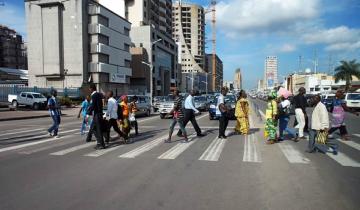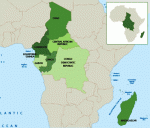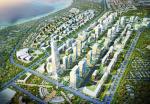DRC not an easy environment, but Real Estate opportunities abound
 With a population of more than 80 million which covers an area the size of western Europe, Real estate market in the Mineral-rich DRC is vast, especially for urban centres, like Kinshasa
With a population of more than 80 million which covers an area the size of western Europe, Real estate market in the Mineral-rich DRC is vast, especially for urban centres, like Kinshasa
THERE are a number of opportunities in the Mineral-rich Democratic Republic of Congo (DRC) real estate sector, but potential investors must ensure they have investigated thoroughly before committing huge resources — Africa Property News has learned.
Doing business in the DRC is difficult, with the country often considered to be one of the most challenging business environments in the world.
Despite a wealth of natural resources, years of corruption, mismanagement and conflict have left the country impoverished and there is still much work to be done to rebuild the DRC.
In the World Bank’s Ease of Doing Business Survey for 2018, the DRC was ranked 184 out of 190 countries, reflecting the poor business environment that Investors are likely to encounter.
That being said, there are also many opportunities for property investors looking for a double digit returns over time despite challenges that faces the country, said Ortneil Kutama, Africa Property News Media Director.
“DRC is the most populous country in the central African region and property developers expect its legal and political structures to synchronise eventually in order to build up the country’s real estate sector,” Kutama adds.
The country has large areas of arable land and is awaiting “big investments”.
With a population of more than 80 million which covers an area the size of western Europe, a projected GDP growth of 3.8% for 2019 and significant untapped minerals resources, the DRC certainly holds much potential.
Real estate market in the country is vast, especially for urban centres, like Kinshasa, Lubumbashi, Kisangani, Goma, Kolwezi, Bukavu and Matad.
Sustained population growth over the last thirty years and the changing socio-economic development led to a rapid development of Congolese towns and a strong demand relative to supply.
Currently, the sector is characterized by a very low number of property developers and the lack of institutions specializing in funding real estate projects.
Property stands out, in response to Government efforts to address the acute housing deficit, particularly among the urban populations in the cities of Kinshasa and Lubumbashi. However, the price of units (above US$ 25,000) is well above the affordability scale for a typical working lower middle income household in Kinshasa (about US$ 500).
DRC has a housing deficit of about 4 million units, while the annual housing requirement is close to 250,000 units. The housing requirement in Kinshasa alone, is estimated at about 140,000 units annually, according to the Centre for Affordable Housing Finance in Africa (CAHF) 2018 report.
Although the demand for affordable housing is evidently high, the few past and ongoing housing projects are skewed towards the needs of middle-income and wealthy individuals. These individuals earn above US$ 1,000, and constitute less than 10 percent of the population).
The dominant sectors of the Congolese economy are mining, agriculture, fishing and forestry. There is also some manufacturing, particularly of textiles, cement and wood products. The main centres of business are the capital, Kinshasa and Lubumbashi, in the mining district of Katanga.
Fast facts about Democratic Republic of the Congo (DRC)
Political Leadership
DR Congo was on Monday making plans to install Felix Tshisekedi as its new president this week after a long and bitter election whose outcome was disputed by the runner-up and shunned by many western nations.
It would mark the first peaceful transfer of power from one president to another in the country since independence from Belgium in 1960.
The country has been in the grip of a two-year crisis over the succession of Joseph Kabila, who announced last year that he would finally step down after nearly two decades in power. Burdened by a history of bloodshed, the DRC has never had a peaceful handover of power since it gained independence.
Minerals and investments
It may not be the most developed country in the Great Lakes region, but its vast and varied mineral resources present huge development potential. The country is a major supplier of cobalt, copper, diamonds, coltan and tin to global markets.
While minerals like copper, diamonds and tin are well known to the general public, it may not be the case with cobalt and coltan. Yet fights over access to these important resources have been one of the causes of the long and simmering instability in the DRC.
Cobalt is used to make magnets and turbines – jet or gas turbines – because of its resistance to high temperatures. According to 2013 US Geological Survey figures, the DRC supplied 48% of global cobalt and has about 47% of the world’s cobalt reserves.
Logistics & Warehousing
The DRC’s transport infrastructure is vastly underdeveloped. Previously built infrastructure is now decrepit after years of mismanagement and war. Given these conditions, reliable and capable transport and warehousing is in high demand.
Cement imports and mineral exports require a change in the sector. Dependent on the current infrastructure, both heavy construction and mining struggle to reach full potential. Transport and warehousing are necessary to access the most remote parts of the country. With Kinshasa and Lubumbashi at opposite ends, a lot still must happen throughout the country.
Business hours
Business hours are typically Monday to Friday, 8am to 5pm, with a two-hour lunch break taken sometime between 12pm and 3pm.
Business language
The Democratic Republic of the Congo is a multilingual country where an estimated total of 242 languages are spoken. French is the language of business in the DRC. Local languages such as Swahili, Lingala, Kituba and Tshiluba are also widely spoken, particularly in more rural areas.
The country is an expanding circle space where English as a foreign language, mainly a school subject, has been used for special‐purpose needs. However, spurred by the irrepressible globalization wind and the influx of foreign multinationals and fortune‐seekers, its prestige has increased significantly.
Greeting
A handshake is the usual greeting between business associates. It’s not unusual for Congolese people to touch each other on the shoulder or arm while talking to those they are familiar with. When shaking someone’s hand with their right hand they may also hold their right forearm with their left hand.
Dress
Lightweight suits are best.
Business culture
Investors doing business in the DRC will find the Congolese to be friendly and welcoming. They generally take pride in their work and are hard working. Appearance is also important and Congolese dress smartly, but modestly.
Status is important in Congolese culture, including in business, and elders and those in authority are respected. Likewise, business structures in the DRC are hierarchical. Although the ideas of the team are generally welcomed, the final decisions are normally made from the top. However, Investors doing business in the DRC have often cited a lack of transparency in the decision-making process as a frustrating issue that can hinder potential business dealings.
Communication style may be direct but direct eye contact is usually avoided. Investors should adapt an attitude of patience when undertaking business in the DRC. The decision-making process can be a drawn out one and it’s not unusual to have meetings rescheduled or even cancelled at short notice.
Corruption
Bribery and corruption are everyday realities and often cited as the biggest constraints to doing business in the DRC. Although efforts in recent years have gone a long way in diminishing the problem, corruption remains a real issue across all facets of business in the DRC. Investors working and doing business in the country should tread carefully when it comes to negotiating and the need for gifts or special favours.
Most Popular
Watch: A Credible Market, the need for Standards in Property Industry
Valuation standards have a significant role to play in helping to regulate professional practice at national, regional and global levels, promoting professional ethics, integrity, impartiality and trust in valuer activities in the property industry. ... Full story







![Burundi’s real estate market has been stifled by unrest in the country for decades. Currently rebels in the country are trying to oust the country’s President Pierre Nkurunziza [PIcture: Reuters] Burundi’s real estate market has been stifled by unrest in the country for decades. Currently rebels in the country are trying to oust the country’s President Pierre Nkurunziza [PIcture: Reuters]](https://www.africapropertynews.com/thumbnail.php?file=articles/Burundi_Property_Market_152027786.jpg&size=summary_large)



